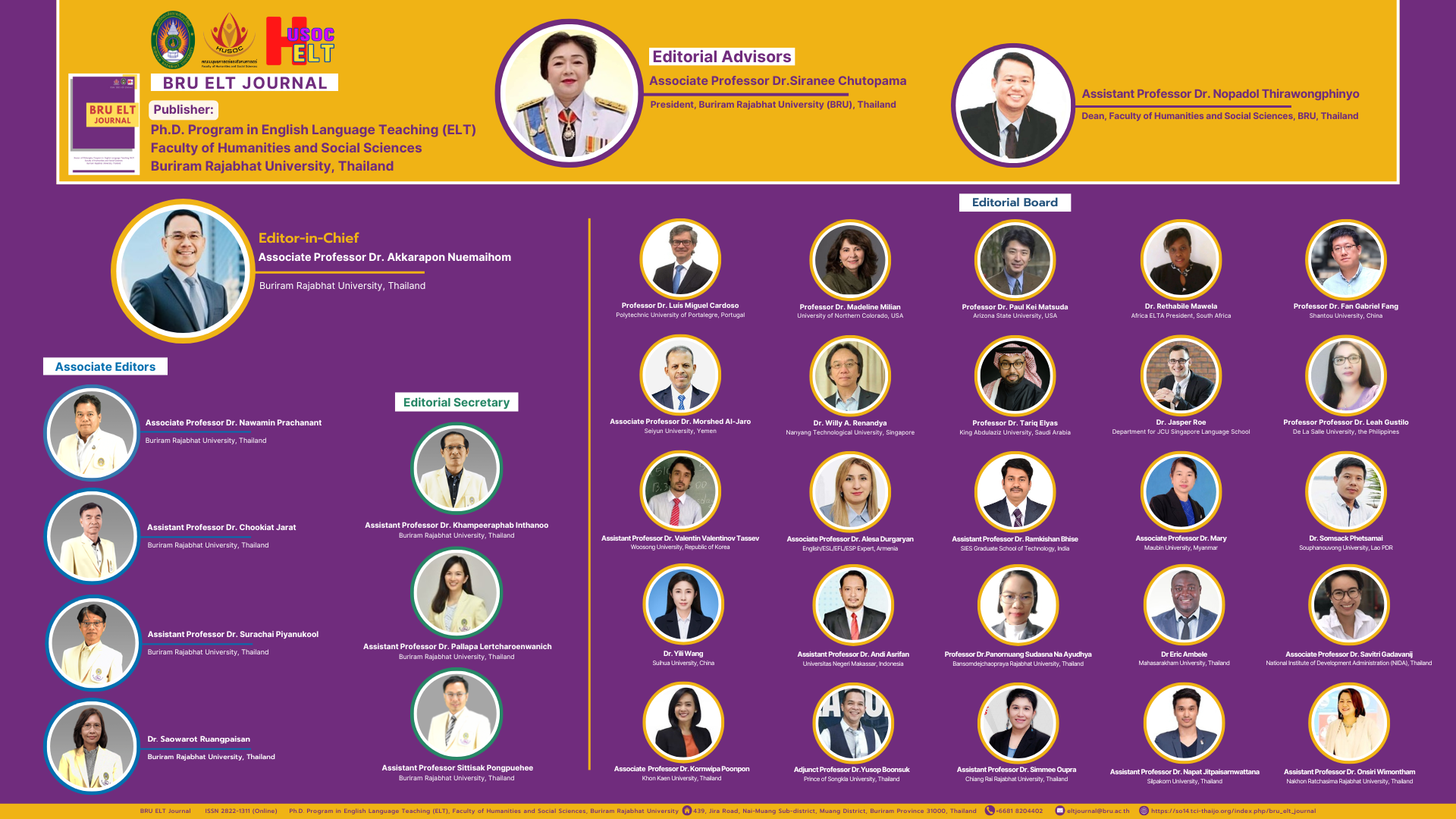Improving College Students’ Metacognition through Self-Paced Learning and Direct Instruction in a Remote Learning Modality
DOI:
https://doi.org/10.14456/bej.2024.11Keywords:
metacognition, self-paced learning, direct instruction approachAbstract
The ability to take full ownership of one’s learning acquisition through metacognition is attributed to the success or failure of students’ educative process. This was the focal point of this quasi-experimental study on the efficacy of self-paced learning and direct instruction in enhancing metacognition among college students engaged in remote learning. The research addressed three primary objectives: first, to assess participants' metacognition levels before and after the intervention; second, to compare the before and after of the intervention in both group’s metacognition across planning, monitoring, and evaluating phases; and third, to determine the difference in metacognition levels between the two groups. 100 college students participated in the study with 50 respondents subjected to self-paced learning intervention and another 50 respondents for direct instruction. The results indicated significant improvements in metacognition levels among participants in both groups. However, the self-paced learning group demonstrated more substantial increases, with a majority shifting from "Low Metacognition" to "High Metacognition" categories. Self-paced learning exhibited larger effect sizes than direct instruction across all phases of metacognitive development. Self-paced learning group respondents experienced more significant increments in metacognitive skills than participants in the direct instruction group. However, future research attempts are encouraged to deepen further the understanding of the intricate play that self-paced learning and direct instruction contribute to enhancing metacognition.
References
Brown, A., Smith, J., & Johnson, R. (2020). Impact of self-paced learning on metacognitive development in college students. Journal of Higher Education, 72(3), 456-472. https://doi.org/10.1353/jhe.2020.0019
Brown, A., Smith, J., & Johnson, R. (2017). Self-paced learning behaviors and self-paced learning outcomes: A longitudinal study. Journal of Educational Psychology, 109(3), 432-448.https://doi.org/10.1037/edu0000166
Boekaerts, M. (2015). Motivation and volition in self-paced learning. In J. D. Wright (Ed.), International encyclopedia of the social & behavioral sciences (2nd ed., Vol. 15, pp. 732-736). Elsevier.
Chen, L., Wang, S., & Liu, H. (2021). Self-paced learning strategies and metacognitive evaluation skills: A longitudinal study. Educational Psychology Review, 36(4), 789-805. https://doi.org/10.1007/s10648-020-09567-z
Chen, L., Wang, S., & Liu, H. (2021). Digital self-paced learning platforms and metacognitive development: A longitudinal study. Educational Technology Research and Development, 69(4), 567-582. https://doi.org/10.1007/s11423-020-09842-5
Efklides, A. (2018). Metacognition: Defining its facets and levels of functioning in relation to self-regulation and co-regulation. European Psychologist, 23(2), 136-147. https://doi.org/10.1027/1016-9040/a000318
Engelmann, S. (1980). Direct instruction: Effective for what and for whom? Educational Leadership, 37(6), 44-49. DOI: 10.1177/0022057480370118
Flavell, J. H. (1979). Metacognition and cognitive monitoring: A new area of Cognitive-developmental inquiry. American Psychologist, 34(10), 906-911. https://doi.org/10.1037/0003-066X.34.10.906
Gagne, R. M. (1985). The conditions of learning (4th ed.). Holt, Rinehart & Winston. https://doi.org/10.1016/S0361-9230(00)00454-2
Hattie, J., & Timperley, H. (2017). The power of feedback. Review of Educational Research, 77(1), 81-112. https://doi.org/10.3102/003465430298487
Johnson, R., Brown, A., & Smith, J. (2020). Impact of self-paced learning on metacognition in college students: A comparative study. Educational Psychology Review, 38(3), 567-582. https://doi.org/10.1007/s10648-020-09558-2
Keller, J. M. (1979). Motivation and instructional design: A theoretical perspective. Journal of Instructional Development, 2(4), 26-34.
https://doi.org/10.1007/BF02903693
Lan, W. Y., & Lin, Y. F. (2012). A review of self-paced learning research in open and distance education. In T. T. Kidd & I. Chen (Eds.), Handbook of research on instructional systems and technology (pp. 680-702). IGI Global. https://doi.org/10.4018/978-1-60960-495-0.ch041
Lee, M., & Smith, K. (2019). The impact of self-evaluation on metacognitive awareness in online learning: A comparative study. Distance Education, 42(2), 102-115. https://doi.org/10.1080/01587919.2019.1570443
Piaget, J. (1977). The development of thought: Equilibration of cognitive structures. Viking.
Rosenshine, B. (2012). Principles of instruction: Research-based strategies that all teachers should know. American Educator, 36(1), 12-19. https://doi.org/10.2307/45423224
Schraw, G., & Moshman, D. (2019). Metacognitive theories. In R. A. Calvo & S. K. D'Mello (Eds.), Handbook of affective computing and intelligent interaction (2nd ed., pp. 1-18). Oxford University Press.
Smith, R., Brown, M., & Lee, K. (2018). Effectiveness of direct instruction in promoting metacognitive development: A meta-analysis. Educational Psychology Review, 31(2), 234-249. https://doi.org/10.1007/s10648-018-9444-0
Smith, R., Jones, L., & Brown, M. (2018). The effectiveness of direct instruction in promoting metacognitive development across different age groups. Educational Research Review, 33, 76-89. https://doi.org/10.1016/j.edurev.2018.09.001
Smith, R., Jones, L., & Lee, M. (2023). The impact of direct instruction on metacognitive development: A longitudinal study. Journal of Educational Psychology, 116(2), 345-360.https://doi.org/10.1037/edu0000564
Vygotsky, L. S. (1978). Mind in Society: The development of higher psychological processes. Harvard University Press. https://doi.org/10.1037/10518-000
Zimmerman, B. J. (2014). From cognitive modeling to self-regulation: a social cognitive career path. Educational Psychologist, 48(3), 135-147. https://doi.org/10.1080/00461520.2013.838138






